
08 Oct 2024
A Radical Rethink: Organising Work for Sustainable Brain Health
Modern workplaces are marked by constant connectivity, a barrage of notifications, and a relentless pace that keeps our brains in a state of perpetual overload. This environment causes cognitive overload, impairing decision-making, attention span, and increasing stress and anxiety. The result? Employees become less effective, more stressed, and prone to burnout.
The relentless pursuit of productivity is taking a serious toll on our cognitive well-being, especially with how fast paced our environments can be both at work and in our personal lives.
The pressure to multitask and stay constantly connected is overwhelming our brains, leading to stress, burnout, and reduced efficiency.
It’s time for a fundamental change in how we approach work.
Leaders must step up and transform work environments to prioritise brain health and sustainability.
But that can be easier said than done. Today, we’re exploring the problem, and how we can resolve it.
Firstly, what is the problem with overload and burnout?
Modern workplaces are marked by constant connectivity, a barrage of notifications, and a relentless pace that keeps our brains in a state of perpetual overload. This environment causes cognitive overload, impairing decision-making, attention span, and increasing stress and anxiety. The result? Employees become less effective, more stressed, and prone to burnout.
The current approach is not working because of these three things:
- Cognitive Overload: The brain isn’t built to handle the nonstop influx of information and distractions. This leads to poor decision-making and decreased productivity.
- Burnout: Chronic stress and high demands result in burnout, characterised by exhaustion, cynicism, and reduced professional efficacy.
- Inefficiency: Time management often overlooks energy management, leading to wasted time and diminished results.
To address these issues, we need to rethink our approach to work. Here are some strategies that we use daily:
- Prioritise Energy Management: Focus on managing energy levels, not just time. Encourage employees to align their tasks with their peak energy periods for maximum productivity.
- Implement Structured Breaks: Encourage regular, short breaks to prevent burnout and maintain cognitive function.
- Reduce Cognitive Load: Streamline communication and reduce unnecessary interruptions. Encourage deep work by minimising constant disruptions.
- Promote Work-Life Balance: Set clear boundaries between work and personal time, and support flexible work arrangements.
- Create a Supportive Environment: Provide resources for mental health and well-being and create a culture where employees feel valued.
- Encourage Single-Tasking: Focus on one task at a time to enhance efficiency and reduce strain.
Leaders play a crucial role in reshaping work environments. By adopting these strategies, leaders can create a more sustainable, efficient work culture that values cognitive well-being and long-term performance.
Want more insights like these? Sign up for our newsletter to stay informed on the latest strategies for effective leadership and sustainable work practices.
